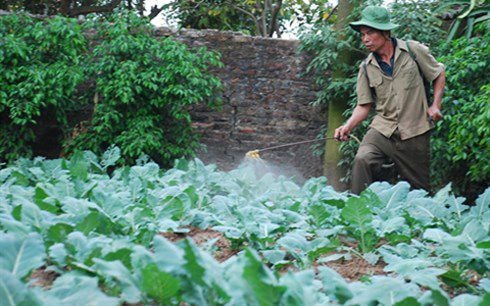Unsafe agricultural products are poisoning people
Associate Professor, Dr. Vu Trong Khai: The most dangerous thing is that Vietnamese agriculture is legally poisoning the entire nation with unsafe agricultural products.
In his opening speech at the 2015 Annual Agricultural Policy Forum with the theme “Vietnam’s agriculture and farmers face integration challenges”, Associate Professor Dr. Vu Trong Khai, former Principal of the School of Agricultural Management and Rural Development II in Ho Chi Minh City, warned: “Vietnam’s current agriculture is not only backward in all aspects, but what is more dangerous than backwardness is that it is legally poisoning the entire nation with unsafe agricultural products.”
 |
| Vietnamese agricultural products are mainly produced by hand and on a small scale (Illustration photo: KT) |
According to Mr. Khai, if this situation is not overcome, Vietnam's agriculture will not only fail to take advantage of the opportunities brought about by international integration, but will also be overwhelmed by the challenges of the international integration process. At that time, the loss to agriculture, farmers in particular, and the economy and people of Vietnam in general, will be enormous.
Mistakes in development strategy
To prove this warning, Associate Professor Dr. Vu Trong Khai pointed out a series of main reasons that have pushed our country's agriculture to face imminent challenges that are not easy to overcome quickly. These are caused by mistakes in industrial and urban development strategies. The process of industrial and urban development in recent years has forced farmers to leave their fields to work in industrial zones. However, they cannot become professional industrial workers, who are attached to industry for their whole lives. When eliminated by their employers, they return to their fields.
Therefore, industrial and urban development does not create a supply of agricultural land for the land market to create large-scale agricultural commodity farms, applying high technology, implementing GAP, producing agricultural products that ensure food safety and hygiene with prices competitive enough in domestic and foreign markets.
In addition, Mr. Khai said that Vietnam has not had a national agricultural product strategy according to ecological agricultural regions. The main agricultural products with high volume and value in each agricultural region today seem to be the result of a spontaneous process. For example, the Mekong Delta, which is the region with the most favorable natural conditions for the development of wet rice cultivation, currently supplies up to 90% of annual rice exports. But the volume of rice produced and exported increases inversely with farmers' income and directly with environmental pollution.
Sadly, Filipinos are now buying Vietnamese rice at a price that is only two-thirds the price of rice consumed domestically. Unintentionally, Vietnamese farmers are having to “reluctantly fulfill their international obligations regarding food safety”.
Disorientation in international integration
Meanwhile, according to Mr. Khai's concern, "we are engrossed in planning strategies and planning for provincial economic development, with criteria for provincial GDP and provincial economic structure. Every province needs good numbers on GDP and economic structure in the direction of increasing the proportion of industrial production value at all costs."
After a period of development with this mindset, people have realized that the economy must be developed regionally, so localities are having to "sit down" together to discuss regional linkage plans. This is a reverse process like "letting chickens out in the garden and then having to catch each one to put them in the cage". Because the product strategy plan and infrastructure construction planning of each economic ecological region already include the content of linkage between provinces by region.
The important thing, according to Mr. Khai, "when determining the national product strategy according to economic-ecological regions, is to first determine the market and target customers - domestic consumption or export, at different levels of each type of agricultural product, not chasing export sales as is the case today."
Therefore, “when integrating into the international economy, Vietnamese agriculture seems to be losing direction. The situation of planting mai trees and cutting down mai trees is still quite common. Even knowing that planting will cause losses, farmers still have to plant them because they do not know how to do anything other than traditional products,” Mr. Khai emphasized.
Another reason why Vietnamese agriculture is under pressure and at risk of losing at home when integrating internationally, according to Mr. Khai, is because farmers are still producing on a small scale, scattered, applying outdated technology, which not only results in low labor productivity and agricultural productivity, with high production costs, but also does not ensure food hygiene and safety, causing environmental pollution. There is a situation where farmers spontaneously produce according to crowd syndrome, following market signals from traders... Enterprises processing and consuming agricultural products with outdated technology and buying and selling whatever they have are not organizers and leaders of the industry value chain.
Another important mistake is that we advocate and invest in building high-tech agricultural zones, instead of investing in developing a high-tech agriculture. "Invisibly, we unconsciously acknowledge the legal existence of an agriculture that does not ensure food hygiene and safety," Mr. Khai said./.
According to VOV.VN
